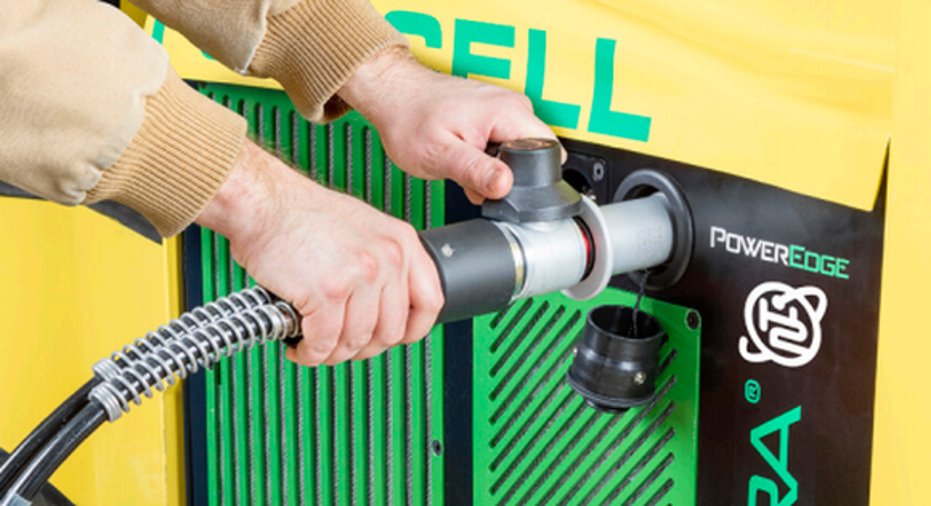Is Fuel-Cells Leader Plug Power Overpowering the Competition?

Converting fleets of forklifts to function on fuel cells is no easy task -- somethingPlug Power knows well. Since its IPO in 1999, the company has yet to electrify its investors' returns. Nonetheless, the company is powering on in pursuit of profits. Let's look at some of the competition standing in its way.
In control
Plug Power has made some inroads in proving the viability of its fuel-cell solution formaterial handling equipment, signing deals with large companies such asHome DepotandWal-Mart.
Image source: Enersys.
But to continue doing so, the company must overcome stalwart power companies that are deeply entrenched in the market -- companies such as Enersys . Producing traditional lead-acid batteries, Enersys is a well-known name in the industry. Of the $2.5 billion in net sales that Enersys reported in fiscal 2015, about 44%, or $1.1 billion, came solely from sales to the forklift market.If Plug Power's plight in the face of Enersys is an uphill challenge, it could grow to an up-mountain challenge should a particular rumor come true. In late 2015, speculation arose that power specialist Johnson Controls was in talks to acquire Enersys. Although Johnson Controls doesn't service the material handling equipment market, it does specialize in lead-acid batteries for other applications. Furthermore, it's working to expand its power-solutions segment following its exit from the automotive-interiors business.
Fuel-cell foe
Perhaps Plug Power's most direct fuel-cell competitor is Hyster-Yale Materials Handling , which in late 2014 acquired Nuvera Fuel Cells. Like Plug Power, Nuvera develops fuel-cell systems, hydrogen storage and delivery systems, and aftermarket solutions.Whereas Plug Power began commercializing its products years ago, Nuvera is still wet behind the ears. According to Hyster-Yale, Nuvera began early stage production of its PowerEdge unit in late 2015. The company secured its first total power-solution agreement with a company in Q4 2015, and it expects to begin shipping PowerEdge units to the customer in the first half of 2016.
Image source: Nuvera.
There is one noteworthy difference between the two companies. Unlike Nuvera, Plug Power is much more reliant on third parties for its operations: Ballard Power Systemssupplies the fuel-cell stacks in Plug Power's GenDrive units; Praxair supplies the hydrogen. Nuvera's ability to be more self-reliant mitigates risks to which Plug Power is exposed. In addition, Nuvera's vertical integration may afford it lower production costs than Plug Power, thereby enabling it to eventually offer a more cost-competitive product to prospective customers.
Everyone else
Plug Power's task -- deploying its fuel-cell systems -- is daunting in light of the various competition it faces. In fact, the company identifiesvirtually all businesses tangentially related to energy and power as potential competitors: major oil companies, specialized electronics firms, and universities, just to name a few.Enersys and Hyster-Yale are two significant challengers, but these are just the big dogs; Plug Power has plenty of smaller dogs nipping at its heels as well.
Lead-acid battery manufacturers are one group with which Plug Power is competing. With firm footholds in the market, these manufacturers provide the security of a traditional energy source that is familiar and trusted. According toIan McClenny, a research associate with Navigant Research,"The use of lead-acid batteries for Class 1, 2, and 3 forklifts trucks often presents a lower first cost price point for materials handling decision-makers." Undoubtedly, some businesses are reluctant to invest in newer technologies -- unwilling to wait for an adequate return on their investments.There is a variety of smaller lithium-ion and fuel-cell suppliers that also represent competition. But it's not just the battery and fuel-cell manufacturers; there are numerous companies that just offer recharging solutions. For example, AeroVironment , mostly known for drones, also provides solutions for forklift operations. According to the company's website, the PosiCharge ProCore Series is a "premium intelligent charging family that supports and charges any forklift battery -- regardless of type, brand, chemistry, voltage, or size."Granted, the efficient energy systems segment, where the PosiCharge business is found, accounts for a small portion -- 15% in fiscal 2015 -- of the company's overall revenue, but it is just one of many businesses that is vying with Plug Power.
Tale of the tape
Simply put: No, Plug Power is not blowing away the competition. Though it deserves praise for what it has accomplished -- presenting fuel-cell technology as a viable option for powering forklifts -- the company still has miles to go before well-established companies like Enersys perceive it as a threat.Of the companies that provide fuel-cell solutions, Plug Power is certainly one ofthe leaders, and, as it's a pure play in the fuel-cell market, some investors may find the company compelling. However, one would be remiss to consider an investment in Plug Power without taking a thorough look at its competition. Varied as this competition may be, the companies have one thing in common: They represent a material threat to Plug Power's success whereas Plug Power doesn't do thesame for them.
The article Is Fuel-Cells Leader Plug Power Overpowering the Competition? originally appeared on Fool.com.
Scott Levine has no position in any stocks mentioned. The Motley Fool owns shares of Johnson Controls, Inc.. The Motley Fool recommends AeroVironment, Home Depot, and Hyster-Yale Materials Handling. Try any of our Foolish newsletter services free for 30 days. We Fools may not all hold the same opinions, but we all believe that considering a diverse range of insights makes us better investors. The Motley Fool has a disclosure policy.
Copyright 1995 - 2016 The Motley Fool, LLC. All rights reserved. The Motley Fool has a disclosure policy.



















